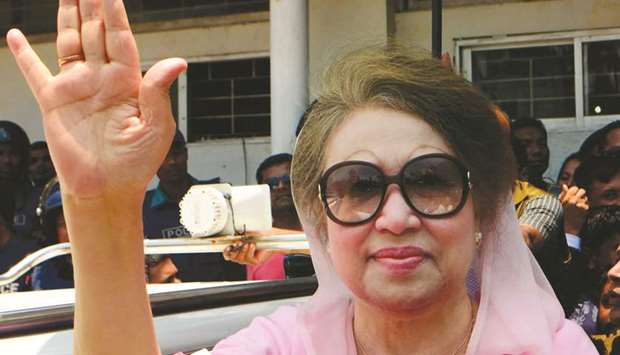Zia is a two-term prime minister whose bitter rivalry with Prime Minister Sheikh Hasina has defined
Bangladeshi politics for years.
Their feud hangs over the run-up to a December election with Zia’s Bangladesh Nationalist Party (BNP) vowing to boycott the polls in a protest against what it has said was Zia’s unfair jailing on trumped up charges.
“The High Court granted her bail for four months,” Moudud Ahmed, a lawyer in the case and also a senior leader of Zia’s party, told reporters after the court ruling.
The decision to release Zia on bail could open the door to her party’s participation in the general election, party secretary-general Fakhrul Alamgir said.
“We cannot say just now. Let our chief come out and then we will sit with her and we’ll discuss it,” Alamgir said.
“We are always in favour of elections, but there must be a congenial atmosphere.”
It was not immediately clear when Zia would be released from detention.
Earlier yesterday, Alamgir said an election without Zia would be “meaningless”. He also said that unless the judgement against her was overturned, she would not be able to contest the election even if she got bail.
Under Bangladesh electoral rules, anyone jailed for more than two years cannot contest an election for five years.
The BNP boycotted the last polls, in 2014, in a protest against Hasina’s scrapping of the practice of having a caretaker government oversee
elections.
A boycott in December would again give the prime minister’s Awami League a clear run at power when the opposition could be benefiting from voter frustration with prices, unemployment, power cuts and anger over what many see as heavy-handed government tactics against opponents.
Another boycott would also dash any hopes of stability, and raise risks for the country’s garment industry, which accounts for 80% of exports, which could face disruption by transport blockades in the event of unrest.
At the same time, efforts to combat Islamist militants behind a string of bloody attacks in recent years risk being hampered by turmoil.
“Politics could become even more toxic,” the International Crisis Group think-tank said in a recent note.
“The government’s continued marginalisation of BNP and its forcing underground of opponents like Jamaat-e-Islami, risk sapping resources from efforts to disrupt jihadists.”
Jamaat, Bangladesh’s largest Islamist party and an ally of the BNP, has been accused of
inciting militancy.
It denies that and opposition parties have denounced the crackdown on Jamaat leaders as a way to silence rivals.
The BNP says the case against Zia is politically motivated by a ruling party riding roughshod over human rights and the rule of law.
“This is a totally one-party-rule here and it is totally dictatorial. Under these circumstances she’s been convicted,” Alamgir said.
Law Minister Anisul Huq said the court decision to grant Zia bail proved that the government did not interfere in court matters.
Home Minister Asaduzzaman Khan, a senior member of Hasina’s party, denied that the government had any role in Zia’s conviction, and said the BNP was merely trying to score political points with its accusations.

